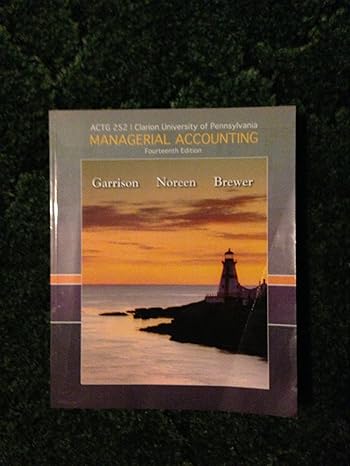Question
Question 52 (2 points) For the month of July, the manufacturing Company X had zero units in beginning inventory of any kind, and started 1,200
Question 52 (2 points)
For the month of July, the manufacturing Company "X" had zero units in beginning inventory of any kind, and started 1,200 units of which... 700 good units were completed and shipped out; 100 units were in WIP at the end of the month. $100,000 was spent on materials during the month (all incurred at the beginning of the manufacturing process). "Normal spoilage" is budgeted at 30% of the completed & shipped out good units. Inspections occur at the end of the
manufacturing process.
For the month of July "spoilage" related material costs for the company totaled
$33,333 $15,833 $17,500 $15,250
Question 56 (1 point)
For companies operating plants in different tax jurisdictions where Transfer Prices are in play, your instructor argued
Transfer Pricing decisions are best made by head office personnel as they have the "accounting/financial analysis/tax" expertise and are unbiased when it comes to making the best decision on behalf of the entire company
Transfer Pricing decisions are best made by operating plant managers as they have the "local market expertise" to make the best decision on behalf of the entire company
Transfer Pricing decisions are best made by operating plant managers as they have the "inhouse expertise" to make the best decision on behalf of the entire company
Question 54 (1 point)
Life-cycle pricing strategies recognize BOTH "unit costs" and "selling prices" can change in either direction, over the life cycle of a product.
True
False
Question 55 (1 point)
Fill in the Blank.............. The operating income of each product line is used as a basis for assigning R&D department costs to the product lines." This is an example of the cost-allocation criteria
cause and effect
benefits received
ability to bear
fairness or equity
Question 57 (1 point)
The goal of "Supply-Chain Inventory Cost Management" strategy is to
ultimately reduce inventory "ordering costs" throughout the entire supply chain
ultimately reduce inventory related costs throughout the entire supply chain
ultimately reduce inventory related costs by retailers
ultimately reduce inventory "carrying costs" throughout the entire supply chain
Step by Step Solution
There are 3 Steps involved in it
Step: 1

Get Instant Access to Expert-Tailored Solutions
See step-by-step solutions with expert insights and AI powered tools for academic success
Step: 2

Step: 3

Ace Your Homework with AI
Get the answers you need in no time with our AI-driven, step-by-step assistance
Get Started


